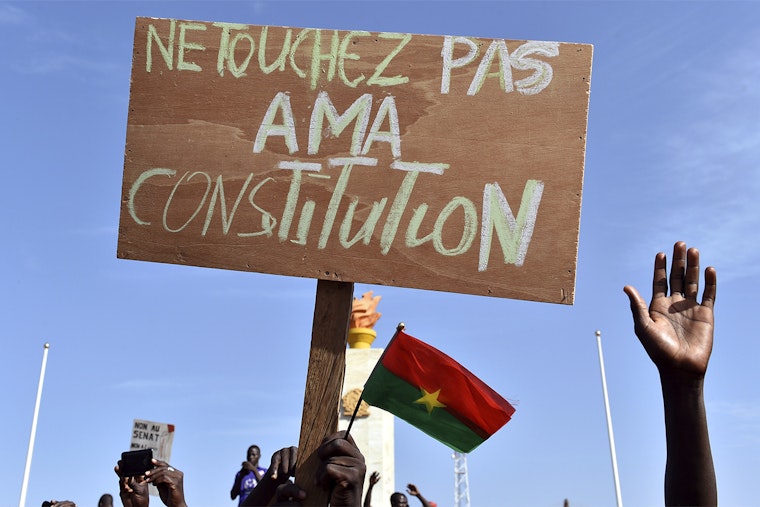Power for Life Falls by the Power of the People
By Mathias Hounkpe

In the land of the upright people, an African titan has fallen. Following almost 30 years of rule over Burkina Faso, a small West African nation of nearly 17 million, President Blaise Compaore announced his resignation by communiqué on October 31, 2014.
It was a reversal of fortunes for a leader who attempted to change the constitution to allow himself a fun for a fifth term in the next scheduled elections in November 2015.
This led to several days of violent citizen protests, and to the dissolution of parliament by a group of military led by the army chief.
With Compaore no longer at the presidential helm, the constitution stipulates that the President of the Parliament must step in and organized elections over the next 30 to 60 days. This is in the case that the military do not seize power beforehand.
Burkina Faso’s case follows an example set by several other African leaders—namely Senegal’s President Wade, Nigeria’s Obasandjo and Niger’s Tanja—all of whom have, at one time or another, tried to amend the constitution allowing themselves to run for another term.
This latest example brings to light an increasingly relevant issue in today’s young democracies: Is it justifiable to restrict the number of terms for heads of states?
Whether “power for life” actually helps or hinders democracy is a question that rises to the forefront of many people’s minds in the lead up to elections in most African countries. This usually happens just around the time leaders are seeking a second (and supposedly last) term in office. It is not an issue that will be going away anytime soon. Several other countries across the continent—from Burundi, (both) Congos, Rwanda and Nigeria—will no doubt be facing similar scenarios in the coming months.
If Africa’s nascent democracies are to transition into fully-fledged systems, ensuring presidential limits is crucial. Experience and history have proven, time and again, that measures to ensure careful, accountable and effective government are the only ways Africa’s young and fragile democracies can be bolstered.
But to ensure an honest discussion, to fairly assess both sides of this coin, let’s examine the pros and cons for capping leadership tenures.
Arguments against Term Limits
People’s sovereignty
For those against term limits, the most common argument advanced is that it goes against the principle of people’s sovereignty—a central tenet of democracy. This opinion asserts that citizens should be able to re-elect a leader limitless times, if desired. Leadership, they argue, should be guided by people’s consent, not pre-imposed durations.
This type of reasoning is fallacious however, as there is no democracy without some form of limitation of people’s power. In nearly all of today’s democracies there are, in one form or another enshrined in their constitutions, limits imposed to the peoples’ power.
Elections first
A second commonly advanced argument against term limitations is that the quality of elections should be prioritized over concerns related to fixed mandates. Proponents here argue that ensuring transparency, integrity and inclusivity in elections helps ensure the voices of the people are faithfully heard and should be prioritized over other concerns (namely limitless re-elections).
While there is certainly a real need to improve the quality of elections in Africa, in this particular debate the argument is overstated. Indeed, the possibility of manipulating elections is not the only reason one chooses to limit the presidential mandates. There are many others, some of which are outlined below.
Finish what was started
A third rational often used is that limitless terms helps preserve stability and order, or the chance for leaders to “finish what was started”. But this assumes the stability, order and development of one country hinges on the efforts of just one person (and not by a political party for example). A society that depends so entirely on a single individual for its stability is perhaps the best evidence of the fundamental instability of that country to begin with. A country can hardly aspire to great ambitions and great achievements if every project must be completed within the limits of their leader’s mandate(s). This is simply not desirable.
Arguments for Term Limits
Delivering on promises and avoiding abuses of power
Looking now on the other side of the coin, there are several reasons why limiting presidential terms are ideal. Firstly, it can actually work in favor to those in power because it places onus and pressure to deliver results if they want to leave achievements as heritage for the country. A leader will, arguably, be more focused at the onset of their mandate if they know their tenure is limited. Knowing one has a finite period can be a safeguard or moderating mechanism to stifle misuses or abuses of power by those ruling a country.
The fear of being accountable for their mismanagements may explain why a majority of African presidents refuse to step down. When a person gets a taste—even just a small taste of power—it often rapidly expands into an unquenchable thirst for more. The longer an individual or a group of politicians stay in power, the more they accumulate power and the more they tend to abuse it, heightening the risks that this group becomes corrupted. This is, not by any means, a desirable outcome in any country that professes to be “democratic.”
Term limits are tested and true
The second reason in support of term limits is, quite simply, that it works. In more than 90 percent of established democracies, ones that have presidential (or semi-presidential) systems (such as the United States or France), have term limits. Instances where there is no formal limitation on presidential mandate are unusual, which makes them exceptions rather than the rule.
Biased voting
It is also worth pointing out that in many African countries, citizens often cast votes along pronounced social, ethnic and religious lines. In such cases, when one group controls the state, it can mean that entire geographical areas and ethnic groups are completely excluded from power. Excluded or marginalized groups may resort to violence to assert themselves and regain some sense of power.
African Union support
The need for a regular change in head of state is vital, and in Africa it pushed the African Union—which was not traditionally a fervent defender of limitation of tenure in power—to include this stipulation in its 2007 Charter on Democracy, Elections and Governance (which came into force in February 2012). In Article 23, it notes “any amendment or revision of the constitution or legal instruments which is an infringement on the principal of democratic change of government …” is part of unconstitutional change of government. Now that the AU has formalized it, leaders, citizens and civil society must ensure they abide to it.
Conclusion
Ensuring presidential limits is an integral part of ensuring a well-functioning, accountable and effective government. While there may be arguments to the contrary, these points are ill founded. Imposing term restrictions is not about violating the people’s consent, nor is it about prioritizing quality elections or providing more time for the completion of projects. It is about making leaders responsible and answerable to their people.
Africa’s young and fragile democracies will hardly become established and consolidated democracies without these kinds of measures in place that help ensure power is carefully managed and the voice of the people still counts.
A version of this post appeared on AllAfrica.com.
Mathias Hounkpe is the political governance program manager at the Open Society Initiative for West Africa.


